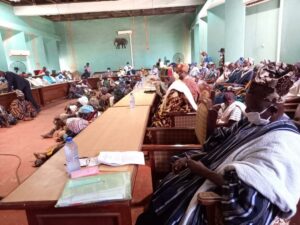Infrastructure deficit affecting academic performance in Northern Region – Chiefs
 Some traditional authorities in the Northern Region say the poor infrastructure in most schools is affecting smooth teaching and learning and students academic performance.
Some traditional authorities in the Northern Region say the poor infrastructure in most schools is affecting smooth teaching and learning and students academic performance.
They said this coupled with lack of furniture, lack of teaching and learning materials for the new curriculum was impeding smooth delivery of lessons, leading to poor students’ performance in national examinations.
They said this, in Tamale, when Norsaac, a civil society organisation (CSO), engaged members of the Northern Regional House of Chiefs to present findings of a study on the performance of students in the region.
The event was part of Norsaac’s “Education for Active Citizenship (EFAC) Project.”
The project seeks to mobilize efforts of citizens, state actors and CSOs in the field of education, private sector, and traditional authorities to re-focus investments in improving teaching and learning in public schools in Northern Ghana.
It is being implemented with support from OXFAM in Ghana.
Statistics from the Ghana Education Service, which was presented during the engagement, showed that in 2019, out of 27 public Senior High Schools (SHSs), 15 scored less than five per cent while in 2020 out of 28 SHSs 16 scored less than five per cent.
The statistics also showed that the region had recorded very low percentages of students passing with six credits.
For Junior High Schools (JHSs), the region recorded low percentages of students who sat for the Basic Education Certificate Examination (BECE), recording 38.4 per cent in 2019 and 43.2 per cent in 2020.
The Chiefs attributed the poor performance trend in the region to poor infrastructure.
“Many of the schools are without furniture forcing students and pupils to either sit on stools or bare floor while others lie on the floor to write, and the situation is very critical,” they added.
The Chiefs, therefore, appealed to government and other stakeholders to adopt and implement stringent measures to address the situation to help reverse the fallen standard of education in the region.
Dr Peter Attafuah, Northern Regional Director of Education, acknowledged the Chiefs’ concerns and reiterated his resolve to engage major stakeholders in the educational sector to find lasting solutions to all issues affecting academic performance in the region.
He appealed to parents to take a keen interest in their children’s education, and provide them with their basic needs to help motivate the children to perform better.
Alhaji Alhassan Mohammed Awal, Executive Director of Norsaac, expressed worry about the poor trend of performance among students in the region and called on all stakeholders to join forces to initiate measures to resolve the issue.
“If we want to reduce the poverty situation in Northern Ghana, we must all prioritize education and synergize efforts and strategies to improve on educational outcomes in the region.”
Source: GNA
